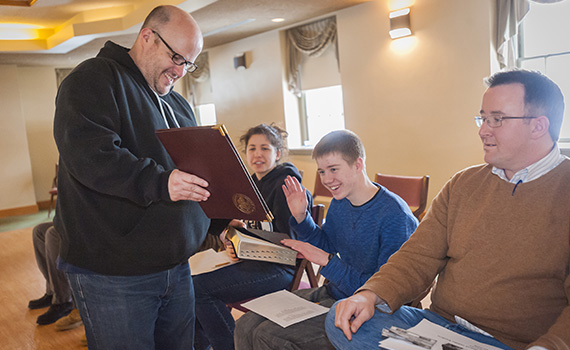
University chaplain Mark Shiner holds the Bible as James Buttner ’15 takes an oath swearing that his votes in Colgate’s model papal conclave would not be influenced by outside parties. (Photo by Ashlee Eve ’14)
In light of the Catholic Pope Benedict XVI’s recent resignation, on Saturday afternoon, 13 “cardinals” reverently took their seats in the Clark Room of James C. Colgate Hall. Gregorian chants playing in the background and a projection of the Sistine Chapel added to the solemn ambience. Then, Colgate’s first model papal conclave to choose the next pope commenced.
“When we heard the pope was resigning, students were asking me a lot of questions about the conclave,” said Mark Shiner, university chaplain and Catholic campus minister.
This curiosity about the process of electing the next pope prompted Shiner and the Newman Community to set up a model papal conclave. Shiner acted as the dean of the College of Cardinals and led the mock proceedings.
“We wanted to hold a papal conclave that was very authentic to the real thing, from the Sistine Chapel to the procedure, and to get people to do research and learn about it,” said Tom Wiley ’13, a member of the Newman Board.
Students and faculty, regardless of religion or belief system, were encouraged to participate. Prior to the conclave, 12 students and one professor chose a current cardinal who reflects their personal beliefs or who they think would make a good pope.
After researching their cardinal, participants adopted that person’s character, discussing their platforms with other contenders over lunches, one-on-one interactions, and through a blog. Saturday’s conclave was the culmination of the process, when cardinals voted for their choices for pope.
“[All the participants] were well informed about the topics, and it was interesting to hear the various perspectives from everyone embodying their different characters,” said religion professor Ben Stahlberg, who represented Cardinal Odilo Pedro Scherer of Brazil.
Three rounds of ballot voting — alternating with discussions of the most pressing issues facing the church and the cardinals extolling their qualifications — narrowed down the candidates before the final votes were cast.
In an overwhelming victory, Pat Gillick ’13 (Cardinal Luis Antonio Tagle of Manila) won the papacy. His first order of business? “I would jokingly ban Twitter, and then I would actually institute abstaining from meat on Fridays all year,” Gillick said.